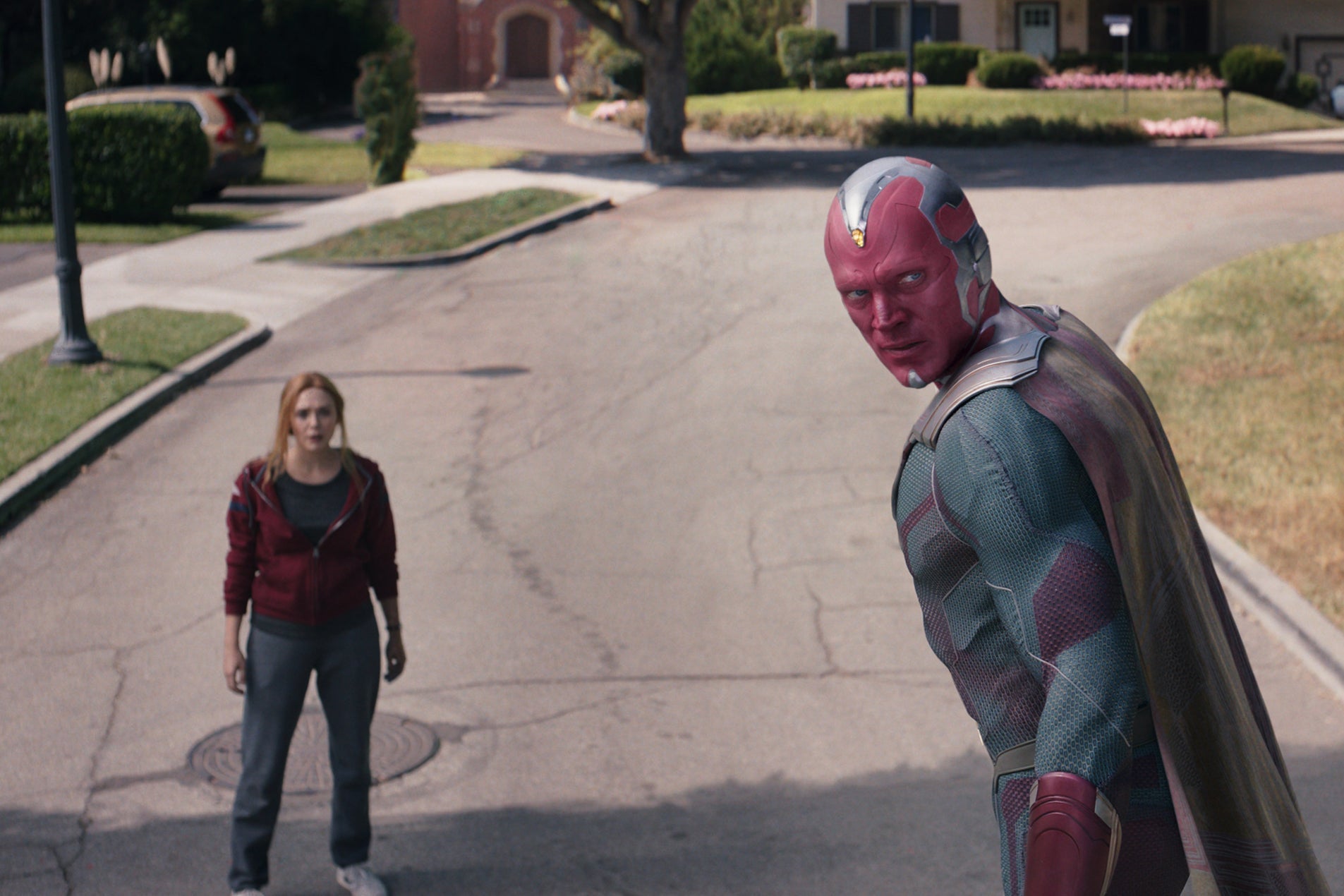After weeks of anticipation, the WandaVision finale landed with a bit of a thud. The problem wasn’t just that the series’ last episode devolved mostly into fights, where the lead-up to it had been uncommonly thoughtful about grief in a cinematic universe with little room for reflection. Rather, the finale seemed to build to an inescapable, almost unbearable conclusion, only to lose at its own game. The emotional complexity that made the show so engaging wasn’t completely obscured, but it was hard to find amid the sea of red, purple, and blue laser beams that flew around the screen
One of the most upsetting aspects of WandaVision has been the discovery of how the residents of Westview have been coerced to play along with Wanda’s TV fantasy world. When they snap out of their hazes, they’re immediately fearful, and fall into pleading with whoever’s around them to help set them free from Wanda’s magic. In the finale, the fact that Wanda has essentially been torturing an entire town of people is made even clearer when Agatha sets the townspeople free. One woman begs for Wanda to let her daughter, apparently confined to her room because Wanda’s story didn’t have a part for her, go; another explains that, when they’re allowed to sleep, they dream Wanda’s nightmares instead. Her grief is poisoning them all. While we viewers admired Wanda’s precise simulation of sitcoms past, she psychically enslaved all of Westview, populating her own private world with unwilling participants so she doesn’t have to live in the real one. Though Wanda finally gives them back their freedom once she fully realizes what she’s done, there’s little other repercussion for the serious damage she’s inflicted on a large group of innocent people.
Most superhero movies don’t even spare so much as a minute for the people who live in the skyscrapers their world-beating battles destroy, so it’s especially frustrating to see WandaVision come so close to acknowledging the cost, and then try to sweep it under the rug. Even the scene that really hammers home how terrifying Wanda’s mind control powers are—her decision to condemn Agatha to being Agnes, the “nosy neighbor,” forever—feels too glib, as if that awful fate were acceptable because of Agatha’s (honestly mild) villainy. The strength of Kathryn Hahn’s performance only serves to emphasize the cruelty of what Wanda is doing, without any remorse or second thought. “Agnes” smiles and recites jokes, but her eyes are full to the brim with tears. We’re supposed to root for Wanda, here?
Less disturbing but more disappointing is that WandaVision’s finale sees the resurrection of Wanda’s husband, Vision. Perhaps that’s unsurprising given that the Marvel Cinematic Universe almost always refuses to let a character stay dead, especially when it’s one of its main heroes, but it’s a letdown given that the driving force of the show was Wanda’s reckoning with his death, as well as the death of her brother Pietro. White Vision, with his memory freshly restored, is now just out there in the universe somewhere, meaning that a reunion with Wanda and the rest of the Avengers isn’t out of the question. Besides it just being funnier if White Vision had ended up nuking himself after Westview Vision pointed out that White Vision was the Vision he’d been sent to destroy—the equivalent of rolling a natural 20 on a speech check—the fact that (a) Vision still exists makes the character’s death feel less meaningful. Does death really have that much weight in a universe in which characters are so easily brought back? And if it doesn’t, what did we just spend two months watching?
WandaVision proved to be an unexpectedly complex show, but that doesn’t make its backpedaling any easier to stomach. If anything, it’s harder not to be let down by the show’s ultimate refusal to reckon with the full emotional scope of the story it seemed to be telling. A show about lasting emotional scars ended up covering them over. It’s the TV equivalent of losing a game of chicken, rushing towards a difficult but satisfying ending, only to swerve at the last minute in the name of setting up the next few Marvel properties. Wanda is off reading spell books in the mountains, but we’re left wandering the streets of Westview, wondering what happened, and why it doesn’t feel that good.
